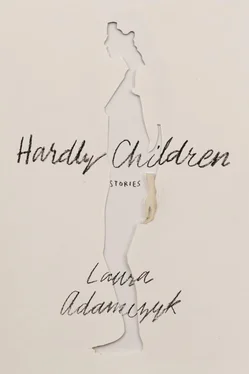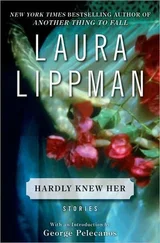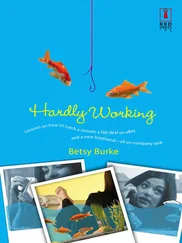No.
She told her mom that you and I were going to come get her to stay with us for the weekend.
I don’t know anything about that.
She didn’t mention something in one of her letters?
Maybe she ran away. She doesn’t have any friends. She’s not popular at all.
Oh, dear, what an awkward girl. Danny’s mother sighs and sighs and shakes her head. It’s terrible not to be popular. Now collect your things to go to your father’s, she says.
As Danny walks back upstairs, she hears her mother say, I am oh so lonely when you girls aren’t here.
* * *
AT HER FATHER’S HOUSE, Danny takes the wad of his money and runs across the street. She buys red sugar ropes and crunchy corn shards and double-glucose snack cakes. When she gets back, she dumps the bag of food behind the bar and calls out dinner. She watches her stepbrothers and sisters wake and crawl and scramble over and divvy it all up, popping open the plastic packages and scooping candies into their mouths. In the living room, the couch is empty. On the television, a man and woman are exploring a dark cave, the man holding a lit torch aloft behind them. The woman wants to turn back. There are bugs with many legs crawling everywhere, sneaking up under her pant leg, disappearing behind her neck into her long hair, but the man insists her forward, spreading the cobwebs open before them.
Danny creaks upstairs. In her stepbrother’s room, she takes the waste basin in the corner and, getting down on her knees, pushes it into the crawl space, leaving a crack in the door behind her. She takes out Margaret’s letters from the back of her pants and drops them into the bin. She unscrews the silver cap and nozzle from her father’s cologne and pours the pink-red liquid over the paper. She takes out a bottle of her mother’s perfume called Fallen Fruit and dumps it in. She takes out a bottle of her older sister’s perfume called Plum Pickens and dumps it in. She takes out a bottle of her own perfume called Whoopsie Daisy and dumps it in. She strikes a match, the sulfur pinching her nose hair as she drops the lit stick in, and a flame jumps out of the bin, enveloping her face, heating her eyebrows and hairline. Danny falls into the door, clicking it shut behind her, and kicks the bin away. The fire pours onto the floor and crawls up the wall. Danny turns and tries to open the door, pinching at the flat screws on the blank side of the handle. She kicks and punches the door. She kicks then turns to push herself against it, drawing her knees to her head and putting her head down and making herself small. The fire blackens the wall of women, their tan legs and flat stomachs and round tits, their eyes and ears and mouths and private areas. They wave in the heat then curl up blank and disappear. When the flames finally whisper into Danny’s hair, licking her ears and tickling her neck, she knows she’s been given a great gift, one that most girls wait their entire lives for.
I.
HERE’S THE OLD STORY:A man goes out for a pack of cigarettes and doesn’t return. He begins inside a home, announces his purpose to a woman, rises, and then leaves. Never to be heard from again. A to B, here to there, easy as pie. This was before everyone stopped smoking and started running. Before phones were four-hundred-dollar rectangles in people’s pockets.
We know it’s not the cigarettes (though the man is a smoker, though he’s most certainly addicted), but a summer claustrophobia at his neck. Theirs is a short, carpeted nothing of a house with curling kitchen tile and all manner of moldy life in the bathroom. The living room and the bedroom are as hot and cluttered as an attic, as used up as an old hotel. The smoke of their endless cigarettes (both his and hers), bits of themselves they’ve discarded into the world, has soaked into the walls, become a stale reminder of a recent past.
No, not so much the cigarettes, but the woman on the couch, as there needs to be someone to leave, someone to (later) relate the leaving to others. The man closes the door behind him, and she stays on that beige and brown flower-print couch drinking whiskey or eating butter pecan ice cream from the carton, watching late-night TV, and waiting, if not for those cigarettes herself, then at least for the man’s return.
There are any number of explanations for why he leaves, besides or in addition to those cigarettes. They are not the reason, but the prop, the key that turns the car on, gets the engine running.
The woman is pregnant. He gets into his car.
He never loved her. He gets into his car.
The woman cheated on him. Once, a long time ago. He gets into his car.
They don’t even fight anymore. He gets into his car.
She no longer sparks him, irks him, turns him on, makes him ache. He gets into his car.
See you soon, she says with a smile.
From the couch, he standing before her, she wraps her blue-jeaned legs around his or unzips his zipper, looking up at him and then down, bemused, reaching in, digging, as though drawing a name from a hat. Who’s our lucky winner tonight? Half-aroused, he gets into his car.
He gets into his car just as he did the week before and the week before that, occupying those tired movements as an extra might pantomime a gesture in the unfocused background of a movie scene. The car he gets into is a faded olive-green Pontiac Bonneville or Chevy Impala, a two-door car, heavy doors, low-slung and hard-topped. Any car that will take him from his neighborhood and into the world, from one life to another, because though the young man knows nothing about what going out for cigarettes means, he knows that he is not long for this life. What he would call his habits. The young man knows he needs another smoke just as sure as he needs to get into his car, addiction as inevitability, as following along with the story. It’s a voice that says, Again, again. A voice that says, And now.
In every version of the story, he gets the cigarettes. We see him, from a distance, from the country road outside the lonely convenience store. He is inside beneath the fluorescent lights, taking part in that (to us) silent exchange with the male clerk. There is the turning away from the counter, the walking out of the door and back toward his car. The night air thick with cicada song, we imagine how it feels to him, throbbing hot like an open wound. And then—
Whether or not he means to leave her, whether or not the car actually breaks down.
In the simplest version, he just keeps driving. His car joins the highway in the opposite direction of his house, the taillights growing distant, their red snubbing out like the spent cigarette he tosses from his window.
In a different version, the car dies. Windows down, the man’s hair loose and dancing and then the wheel going heavy in his hands. A moment, less than a second, of Aw, shit, Oh, no, Come on, not now, and then something like relief, like giving up.
Some kind of strange magic or any song that sounds like another song in that last snap of radio fuzz before it too blinks off. It’s 1976. The cars are longer; the jeans fit better. The country is celebrating, but our guy thinks only of slumping deep into that uncomfortable couch in his home and feels no part of this party, feels like he’s outside of time. And isn’t that what getting in the car is all about in the first place? Stepping outside of some present? Moving into a different one? He feels himself cracking open, shedding some old skin. His brown hair hangs greasy to his shoulders and his mustache needs trimming, but these are only details—nothing of him cannot be changed. The car and himself in it are set on a sweeping arc to the gravelly shoulder of the road, and he relinquishes himself to its pull, the car rolling slower and slower, he feeling, knowing, that when the car stops completely, he will entirely enter his fate. A disappearance, but at the same time, a kind of birth. What better—to become part of something grander? The night is open, black and blank, and he (the car completely dead now) grabs his cigarettes, gets ready to take his first steps into it.
Читать дальше











